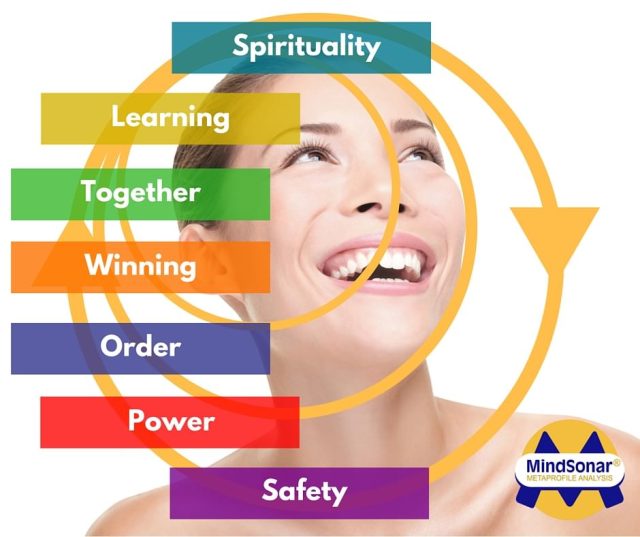We use criteria all the time, MindSonar registers some of them
Criteria are the standards you use to evaluate things. MindSonar registers criteria and assigns them to certain value types. You use the yardsticks of criteria all the time, usually without being aware of them. For instance: when you meet someone new, you may be using ‘smart’ as a criterion. If the person seems ‘smart’ to you, you have a good feeling about them. Or you might use ‘authentic’ as a criterion. If they strike you as ‘authentic’, you feel good about them.
You can have all kinds of criteria. You can have hard to fulfill criteria like: ‘As smart as Nietzsche’. If you use that criterion, you’ll find a large proportion of people ‘not the sharpest tool in the shed’. Or you can have much ‘easier’ criteria, like ‘Smart enough to navigate with Google maps’. That will make a much larger percentage of people seem ‘pretty smart’ to you. You can have specific criteria, like ‘Being a fan of the first three albums of the Rolling Stones’ or general criteria like ‘Liking music’. You can have emotional criteria like ‘Helping me feel safe’, or visual criteria, like ‘Looking healthy’. And so on and so forth. In day-to-day life, you use hundreds of criteria.
Values are very important criteria, MindSonar registers their hierarchy
Some criteria are very important to you. When a criterion is very important to someone, we call if it a value. MindSonar not only registers values, but also their hierarchy: which one is most important, which one is next, and so on. For instance: ‘Honesty’ might be a value when you meet someone new. If they don’t seem very energetic, you might not mind. But if they strike you as dishonest, you might think twice about doing anything with them. In that case, ‘Being energetic’ is obviously lower in your hierarchy of criteria than ‘Honesty’.
In general, you are highly motivated by goals, plans, dreams, projects and activities match your criteria. That’s why we sometimes call the values measured by MindSonar ‘motivational drives’.
Thinking styles (meta programs) are ways in which you handle your values
Thinking styles (meta programs) are ways in which you handle your values.
For instance: Are you assuming people will be honest (meta program ‘Matching’) or are you assuming they will be dishonest (meta program ‘Mismatching’)? Is it important to you that a person be honest (meta program ‘Towards’). Or is it important to you that they not be dishonest (meta program ‘Away from’)?
MindSonar determines value types (Graves Drives), which indicate the sort of values you hold
Graves Drives are a typology of values. In MindSonar we use them to make it easier to compare a value with other values. For example: is honesty about power for you (the red Graves drive)? Or is it about community (the green Graves drive)?
MindSonar measures mindsets: a combination of value types and thinking styles
MindSonar defines a mindset as a combination of value types (Graves drives) and thinking styles (meta programs). Since there are so many different combinations possible every mindset is unique. MindSonar measures mindsets for a given situationand assumes people may have different mindsets in different circumstances.

MindSonar’s values typology was developed by Claire W. Graves
The US psychologist Claire Graves theorized that there are eight value systems, which have evolved over the course of human history. He assumed that each value system flows from the previous one as a response to:
- Ever more complex life circumstances
- Problems with the previous value system.
Graves and Maslow
Graves was a professor of Psychology in the sixties and seventies of the 20th century at Union College in New York, the same university where Abraham Maslow taught. Maslow was developing his motivation theory (the famous Pyramid of Needs), which shows the development of individual needs. Graves thought Maslow’s model did not offer a broad enough base for understanding man as a bio-psycho-social-cultural being. He assumed that human behaviour was not determined by individual needs alone, but by a combination of social, biological and psychological factors
Graves categorization
MindSonar measures the extent to which someone’s criteria are associated with Graves Drives. We call this Graves categorisation: MindSonar puts someone’s criteria (which they have formulated already) into Graves categories

About the author
Jaap Hollander
Psychologist, living in the Netherlands. Founded MindSonar in 1995. Directs MindSonar Global, which manages the ICT development, applications and the curriculum of the MS Certification Trainings. Working part time as a trainer, writer and coach as well as being an expressionist painter (artist name JAAPH, see jaaph.com). Has written 10 books on NLP and Provocative Coaching.

